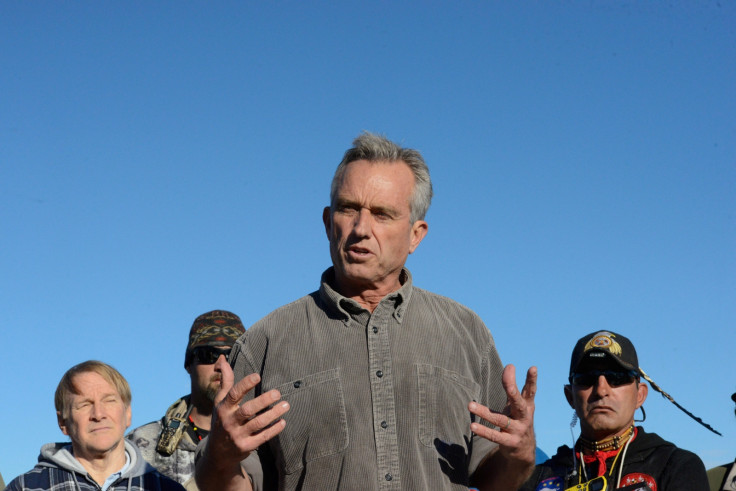Protests against Dakota Access pipeline spread as firms seek court order to complete construction
Robert F. Kennedy Jr, founder and president of Waterkeeper Alliance, said the project was an 'environmental crime'.
Protests against the construction of the Dakota Access pipeline have spread across North America. Demonstrators on Tuesday (15 November) demanded the US government to halt or reroute the pipeline as the firms behind the contentious project sought help of a federal court to complete it.
According to reports, the Tuesday's rally was the largest protest to date against the pipeline, where thousands of people demonstrated outside Army Corps of Engineers offices, banks and energy companies. A number of people got arrested, especially in North Dakota, where the most heated protest took place.
Morton County Sheriff's Department claimed that at least 26 people were arrested in Cannon Ball, near the path of the pipeline, and added that protestors blocked a railroad with a pickup truck then attempted to set the vehicle on fire.
The development came a day after the US authorities on Monday delayed the pipeline work and called for further analysis and discussion. The $3.7bn (£2.94bn) Dakota access pipeline is designed to transport crude oil from North Dakota into Illinois, which will also run through the states of South Dakota and Iowa.
The 1,170-mile pipeline crosses 50 counties and three major rivers. However, the Standing Rock Sioux Tribe along with a number of environmentalists have been protesting against the construction since summer as they fear the line will ruin sacred sites and contaminate drinking water for them.
North Dakota's governor Jack Dalrymple also criticised the government's move and said a potential delay in completion of the Dakota Access oil pipeline "does nothing but prolong and intensify the public safety issues imposed on Morton County and the state of North Dakota since the beginning of August".
While, Robert F. Kennedy Jr, founder and president of Waterkeeper Alliance, said the Dakota Access pipeline was an "environmental crime."
"There's real victims," Kennedy was quoted as saying by Reuters at the Cannon Ball protest.
Meanwhile, Energy Transfer Partners (ETP) – the owner of the pipeline – and its subsidiary, Sunoco Logistics Partners, who have filed petition in the US district court in Washington, seeking to "end the Administration's political interference in the Dakota Access Pipeline review process", has said the project is legal and need no further government approvals.
The companies have also requested the court to announce the same publicly.
"To propose, as the Corps now does, to further delay this pipeline and to engage in what can only be described as a sham process sends a frightening message about the rule of law," Kelcy Warren, Energy Transfer's chief executive officer, said.
However, Dave Archambault II, Chairman of Standing Rock Sioux, said the companies were wrong and their legal action was baseless.

© Copyright IBTimes 2025. All rights reserved.



















